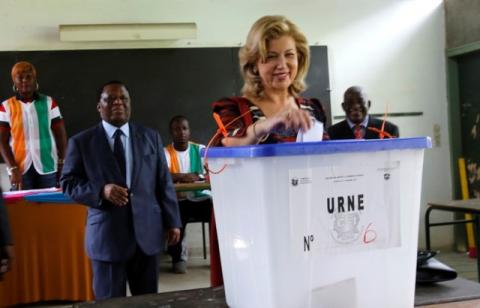Advertisement
Ivorian opposition seeks return to political mainstream in polls
ABIDJAN (Reuters) - Voters in Ivory Coast cast their ballots in parliamentary polls on Sunday as the main opposition party sought to break President Alassane Ouattara's near monopoly of the legislature in the West African nation.
The Ivorian Popular Front (FPI), the largest opposition party, has largely boycotted politics since a 2011 war which saw then President Laurent Gbagbo, its founder, ousted and many of its leaders jailed.
"We are confident that after this legislative vote, the FPI will make a remarkable and important return with a parliamentary majority," FPI President Pascal Affi N'Guessan told Reuters.
The FPI is fielding 186 candidates for the 255 parliament seats and is expected to make a strong showing. Ouattara's supporters hold about 85 percent of seats in the outgoing National Assembly.
Outtara said he expected Ivory Coast to have a "diversified parliament" after the polls and called for candidates to remain calm and respect results, due by Monday.
Despite five years of peace, Ivorians remain deeply divided along political and ethnic faultlines. And both they and the investors who are now flooding in crave the stability that will allow the world's top cocoa grower to cement its status as the continent's rising star.
Dozens of people gathered outside polling stations early on Sunday in steady drizzle in the opposition stronghold of Yopougon in the commercial capital of Abidjan.
"Our candidate needs to get in," said 32-year old Jean Adepo. There were no signs of tensions.
More than 3,000 people were killed in the brief 2011 civil war that followed Gbagbo's refusal to accept his defeat to Outtara in elections. Since then, the French-speaking nation has lured back investors and the economy is set to grow by 8 percent this year.
Ouattara's coalition RHDP, which is suffering from some internal divisions, is promising to deliver more growth.
N'Guessan's FPI argues, however, that economic expansion is simply papering over cracks left over from the crisis years, and that without a strong counterweight to Ouattara's power there can be no long-term stability.
N'Guessan, like most FPI leaders, was jailed after the war. He was released in 2013, but many opposition supporters remain in prison.
(Reporting by Loucoumane Coulibaly and Ange Aboa; Writing by Emma Farge; Editing by Elaine Hardcastle/Keith Weir)



















Add new comment